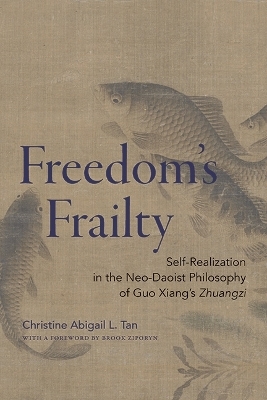
Freedom's Frailty
Self-Realization in the Neo-Daoist Philosophy of Guo Xiang's Zhuangzi
Seiten
2024
State University of New York Press (Verlag)
978-1-4384-9746-4 (ISBN)
State University of New York Press (Verlag)
978-1-4384-9746-4 (ISBN)
Draws on Guo Xiang's commentary on the Zhuangzi to construct an account of freedom that is both metaphysical and political.
This book starts with the radical premise that the most coherent way to read the Zhuangzi is through Guo Xiang (d. 312 CE), the classic Daoist text's first and most important commentator, and that the best way to read Guo Xiang is politically. Offering an investigation of the notions of causality, self, freedom, and its political implications, the book provides a comprehensive account of freedom that is both ontological and political, using Guo's notion of self-realization (自得 zide). This is a conception of freedom that introduces a "dependence-based autonomy," in which freedom is something we achieve and realize through our connection to others. The notion that a subject is born with freedom—and that one can return to it by isolating oneself from others—would be a strange idea not just to Guo but to most Chinese philosophers. Rather, freedom is complex and frail, and only the kind of freedom that is collectively attained through radical dependence can be worth having. In sum, the book makes a new contribution to Chinese philosophical scholarship as well as philosophical debates on freedom.
This book starts with the radical premise that the most coherent way to read the Zhuangzi is through Guo Xiang (d. 312 CE), the classic Daoist text's first and most important commentator, and that the best way to read Guo Xiang is politically. Offering an investigation of the notions of causality, self, freedom, and its political implications, the book provides a comprehensive account of freedom that is both ontological and political, using Guo's notion of self-realization (自得 zide). This is a conception of freedom that introduces a "dependence-based autonomy," in which freedom is something we achieve and realize through our connection to others. The notion that a subject is born with freedom—and that one can return to it by isolating oneself from others—would be a strange idea not just to Guo but to most Chinese philosophers. Rather, freedom is complex and frail, and only the kind of freedom that is collectively attained through radical dependence can be worth having. In sum, the book makes a new contribution to Chinese philosophical scholarship as well as philosophical debates on freedom.
Christine Abigail L. Tan is Lecturer at the National University of Singapore.
Acknowledgments
Foreword
Brook A. Ziporyn
1. The Question of Freedom
2. A Flattened Ontology and the Logic of Convergence
3. On the Self: Limits and Expanse
4. Freedom as Autonomy: Independence and Dependence
5. Freedom as Self-Realization: Dimensions of Zide 自得
Conclusion: "Freedom In" and Social Change
Notes
References
Index
| Erscheinungsdatum | 06.04.2024 |
|---|---|
| Reihe/Serie | SUNY series in Chinese Philosophy and Culture |
| Vorwort | Brook Ziporyn |
| Zusatzinfo | Total Illustrations: 2 |
| Verlagsort | Albany, NY |
| Sprache | englisch |
| Maße | 152 x 229 mm |
| Gewicht | 227 g |
| Themenwelt | Geisteswissenschaften ► Philosophie ► Metaphysik / Ontologie |
| Geisteswissenschaften ► Philosophie ► Östliche Philosophie | |
| Geisteswissenschaften ► Religion / Theologie ► Weitere Religionen | |
| ISBN-10 | 1-4384-9746-6 / 1438497466 |
| ISBN-13 | 978-1-4384-9746-4 / 9781438497464 |
| Zustand | Neuware |
| Haben Sie eine Frage zum Produkt? |
Mehr entdecken
aus dem Bereich
aus dem Bereich
Buch | Hardcover (2024)
Matthes & Seitz (Verlag)
CHF 41,90
Über konstruktivistisches Denken in der Theologie
Buch | Softcover (2024)
Verlag Herder
CHF 79,95


